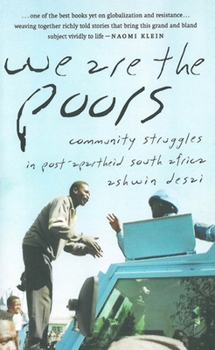We Are the Poors: Community Struggles in Post-Apartheid South Africa
Select Format
Select Condition 
Book Overview
When Nelson Mandela was elected president of South Africa in 1994, freedom-loving people around the world hailed a victory over racial domination, injustice and inequality. The end of apartheid did not change the basic conditions of life for the majority of oppressed South Africans, however. Material inequality has deepened and new forms of resistance have emerged in commnities that have discovered a common oppression and solidarty and forged new...
Format:Paperback
Language:English
ISBN:1583670505
ISBN13:9781583670507
Release Date:April 2002
Publisher:Monthly Review Press
Length:160 Pages
Weight:0.50 lbs.
Dimensions:0.4" x 6.1" x 9.1"
Related Subjects
Africa Discrimination & Racism Economic Conditions Economic Policy Economic Policy & Development Economics History Humanities Political Economy Political Science Politics & Government Politics & Social Sciences Poverty Public Policy Race Relations Social Science Social Sciences South Africa Specific DemographicsCustomer Reviews
2 ratings
A significant and timely contribution
Published by Thriftbooks.com User , 22 years ago
We Are The Poors: Community Struggles In Post-Apartheid South Africa by South African educator, journalist, and community activist Ashwin Desai is an informed and informative explanation of how the end of apartheid and the election of Nelson Mandela as President of South Africa in 1994 failed to end the conditions of economic, social, and political inequality for the oppressed majority of South African blacks. Nonetheless, new forms of solidarity and resistance to conditions of inequality have emerged, principally in the form of new and dynamic political identities as reflected in the growth of community movements, eventually coming together in massive anti-government protests at the time of the 2001 UN World Conference Against Racism. We Are The Poors is a significant and timely contribution to contemporary South African studies.
A powerful account of resistance to market fundamentalism
Published by Thriftbooks.com User , 22 years ago
Desai's book is about elderly women who will put their bodies between their neighbour's house and the men with guns and dogs and sunglasses who have come to effect another eviction. It's about the ecology of the neighbourhood and the struggles to constitute the people stuck on the wrong side of the razorwire into movements. It is about fighting and tenderness and coming to Durban.Desai's story starts in Chatsworth, Durban. Here the new South Africa meant unemployment for the poor after 10 000 jobs in the clothing industry were sacrificed to The Market when tariffs protecting our market from sweatshop imports were removed 4 years ahead of the WTO schedule. For many this was followed by disconnections from electricity and water and then evictions from their homes as the Durban Metro began to reorganise the provision of basic, life sustaining services in accordance with `international norms' and under the cold logic of profit. Desai tells us how a movement of the poor was built in Chatsworth, how it spread to other townships in Durban, drew in students and workers, made connections with similar movements developing in Johannesburg and Cape Town, put somewhere between 20 000 and 30 000 people on the streets outside the UN conference on racism in Durban last year and became part of the global movement of movements against the subordination of all aspects of society to The Market.All these years after Machiavelli and Sartre and Fanon much academic work continues to flee the disorder and mess of life for the more comfortable worlds of abstracted empiricism and theory where the sterile manipulation of numbers or words becomes a self-referential end in-itself. Desai's book has no elaborate graphs or references to Homi K. Bhabha. Numbers and theories are only employed to illuminate lived experience. This book, with its stories of children prostituting themselves to stave off their family's eviction and mothers fighting off the police, can not be reduced to a power point presentation. Desai describes it as "journalism - an account from the frontlines of the establishment's `undeclared war' on the poor." Scholars like Patrick Bond and Hein Marais have published valuable critiques of the herding of the energies and hopes of the democratic movements in to the Market's corral. And David McDonald and James Kilgore (writing as John Pape) have shown that in the post-apartheid era up to 10 million South Africans have been disconnected from water; the same number have been disconnected from electricity; a further 2 million people have been evicted from their homes and 1.5 million have had their property seized for failure to pay their water and electricity bills. McDonald and Kilgore have also found that the majority could not pay their water and electricity bills, that many of those who do pay do so at the expense of things like school fees and health care and so the idea of a `culture of non-payment' should be seen as, at best, a myth. They also show that none of





